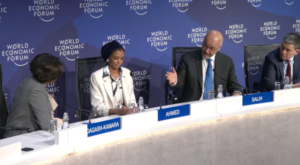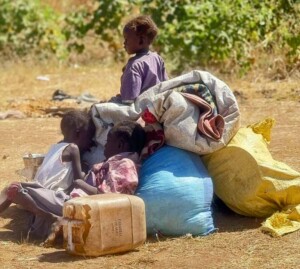HRW: Civilians attacked, students and journalists detained in 2017
In the past year Sudan’s human rights record continued to be defined by government repression and violations of basic civil and political rights, restriction of religious freedoms, and disregard for obligations on civilian protection under international humanitarian law.
 Wounded people in Kalma camp protests, South Darfur, 22 September 2017 receive help from Unamid peacekeepers (RD)
Wounded people in Kalma camp protests, South Darfur, 22 September 2017 receive help from Unamid peacekeepers (RD)
In the past year Sudan’s human rights record continued to be defined by government repression and violations of basic civil and political rights, restriction of religious freedoms, and disregard for obligations on civilian protection under international humanitarian law.
In its World Report 2018 on Sudan, Human Rights Watch (HRW) highlighted a number of the human rights violations and atrocities that the country has witnessed in the year 2017.
The human rights organisation reported that civilians have been attacked by Sudan’s Rapid Support Forces (RSF) and other government-aligned forces in Darfur, South Kordofan and Blue Nile, in spite of the government’s repeatedly extended unilateral ceasefire.
“Sudan failed to provide accountability for serious crimes committed during the conflicts, or other serious human rights violations,” the report read. Despite reduced fighting in all three war zones, government forces and allied militia attacked civilians including in camps for displaced people throughout the year.
In May and June, the RSF attacked villages in North and Central Darfur, forcing tens of thousands to flee. RSF fighters were also responsible for large-scale attacks on villages during counterinsurgency campaigns from 2014 to 2016.
In Blue Nile and South Kordofan, conflict continued and there were sporadic government attacks on civilians. In the rebel held areas of both states, hundreds of thousands lacked sufficient food and basic supplies because the government and rebels failed to agree on modalities for the delivery of essential items.
Detentions
The national security agency NISS detained student activists, human rights defenders, and members of opposition parties. Authorities prosecuted activists and journalists for their reports and confiscated newspapers.
Security officials detained opposition members, journalists, and labor leaders throughout the year, often for long periods without charge or access to lawyers. They routinely beat detainees during interrogations. One Sudan Congress Party (SCP) member was held for 50 days without charge, and beaten so badly that he required surgery upon his release.
In December 2016, a British journalist and his Sudanese-American colleague were detained first in Darfur then transferred to Khartoum for almost two months without charge and said they were subjected to beatings, electric shocks, and mock execution, for conducting an investigation in Darfur.
Freedom of expression
Government security forces used excessive force to break up protests across the country, including protests at university campuses. In September, government forces opened fire on protesters in the Kalma displaced people’s camp in South Darfur, killing more than five and wounding two dozen. The residents were protesting President Omar Al Bashir’s visit to the camp.
Security officials also continued to restrict media by harassing and detaining journalists, charging them with crimes, and confiscating editions of newspapers that published articles deemed too sensitive.
International actors
HRW stressed that in January, then-United States President Barack Obama issued an executive order promising to lift broad economic sanctions if Sudan met certain conditions. While these did not require measurable improvements in human rights, the sanctions have been lifted.
The EU has pledged hundreds of millions of euros to Sudan in support of the regional Khartoum Process, to manage migration. The aid programs have been widely criticized on grounds that they encourage or assist the RSF to carry out abusive operations.
In September, the UN Human Rights Council renewed the mandate of the Independent Expert to monitor and advise on human rights for another year, but used language foreshadowing the end of the mandate if there is “continued and sustained improvement” to the situation in the country, risking prematurely ending the mandate in coming years.











 and then
and then